To start a community Bible study, first clarify your purpose and set clear goals focused on spiritual growth or community impact. Choose an accessible location and time that fit everyone’s schedules. Gather interested participants through outreach and personal invitations. Plan a flexible structure with meaningful discussions, prayer, and relevant study materials. Foster a respectful, welcoming environment that encourages faith-centered conversations. Keep outreach ongoing to grow your group, and seek divine guidance through prayer to guarantee alignment with God’s will. Continue to explore how to build a vibrant, impactful group.
Key Takeaways
- Define the purpose, goals, and desired outcomes to guide planning and content selection.
- Choose an accessible, welcoming location and convenient meeting times to encourage participation.
- Invite interested community members through outreach, personal invitations, and promoting a friendly atmosphere.
- Incorporate prayer, faith, and trust in God’s guidance throughout planning and meetings.
- Foster a respectful, inclusive environment and promote ongoing outreach to grow and sustain the community.
Assessing Your Purpose and Goals
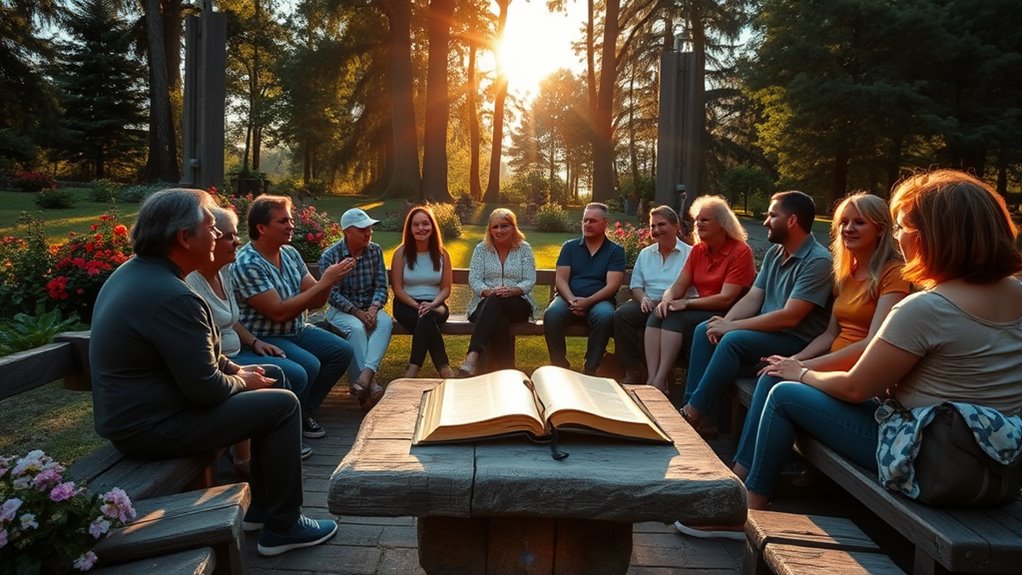
Have you clearly defined why you want to start a community Bible study? Knowing your purpose helps guide every decision you make. Whether your goal is to foster spiritual growth or to create a positive community impact, clarity keeps you focused. Think about what you hope participants will gain—deeper faith, stronger relationships, or a sense of belonging. Setting clear goals also helps measure success and keeps everyone aligned. Consider whether your focus is personal spiritual development or serving the wider community. When your purpose is well-defined, you can craft relevant content, invite the right people, and build meaningful connections. Ultimately, a clear purpose ensures your Bible study serves both individual spiritual growth and the broader community.
Selecting a Suitable Location and Time
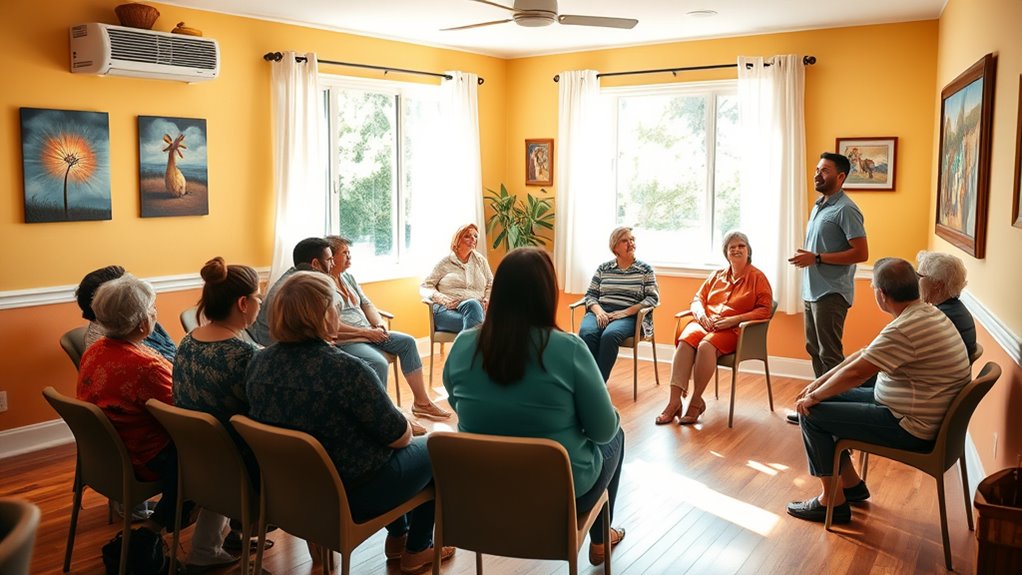
Choosing the right location and time is essential for the success of your community Bible study. You want a space that encourages connection and is easy for everyone to access. Consider seating arrangements that promote engagement, such as circle seating or small clusters. Accessibility considerations are vital—pick a venue with ramps, wide doorways, and nearby parking. Timing should accommodate participants’ schedules, avoiding conflicts with work or school. Use this guide to help decide:
| Location Type | Best for | Accessibility Tips |
|---|---|---|
| Community Center | Larger groups | Ramps, wide entrances |
| Church Hall | Regular meetings | Elevators, accessible restrooms |
| Library | Quiet study | Comfortable seating, easy parking |
| Coffee Shop | Casual gatherings | Close to transit, accessible tables |
Select wisely, and your group will thrive!
Gathering Interested Participants
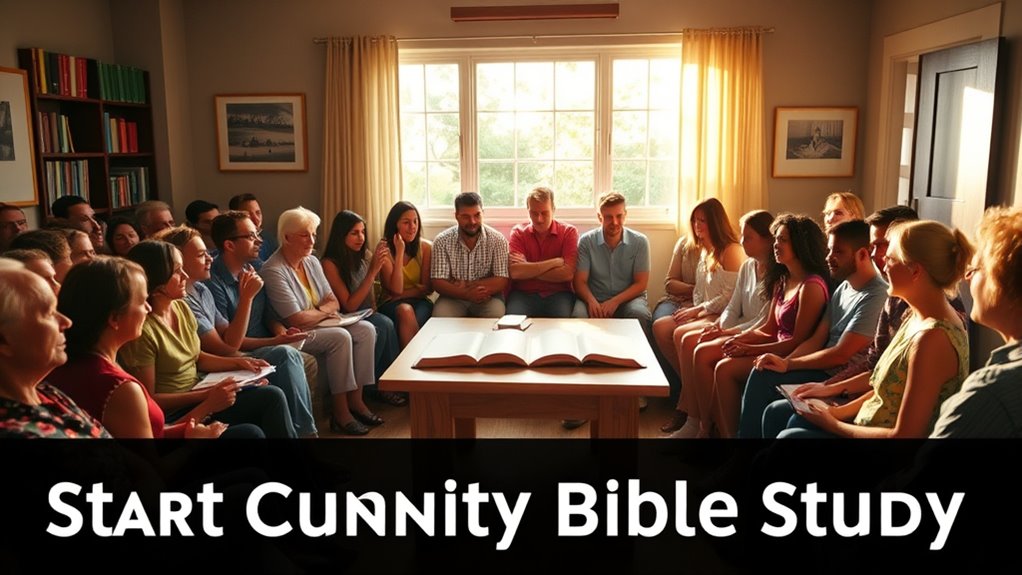
Once you’ve secured a suitable location and time for your community Bible study, the next step is to gather interested participants. You can start with simple community outreach, inviting neighbors, friends, or colleagues who might be interested in faith sharing. Consider creating flyers or posting on local online platforms to spread the word. Personal invitations often have a stronger impact, so don’t hesitate to reach out directly to those you think would benefit from or contribute to the group. Emphasize the welcoming nature of your Bible study and the opportunity for meaningful faith sharing. By actively involving your community and making others feel included, you’ll build a diverse and committed group ready to grow spiritually together.
Planning the Structure and Format

To establish a strong foundation, you need to decide how often your group will meet and what study material you’ll use. Clarifying leadership roles helps guarantee the study runs smoothly and everyone stays engaged. Think through these points carefully to create a clear structure that encourages growth and meaningful connection.
Determine Meeting Frequency
Deciding how often your community Bible study meets is essential for ensuring consistency and member engagement. When considering timing considerations, think about members’ schedules and availability. Do they prefer weekly sessions for steady engagement or biweekly meetings to allow more preparation time? Your group’s frequency preferences will influence attendance and commitment. It’s important to find a balance that fits everyone’s lifestyles without overwhelming participants. Starting with a manageable schedule, like weekly or biweekly meetings, can help establish routine and build community. Be open to feedback and flexible enough to adjust if needed. Consistency is key, so choose a frequency that you can realistically maintain while encouraging active participation and spiritual growth.
Choose Study Material
How you choose your study material sets the tone for your community Bible study and directly impacts participants’ engagement and growth. Select a scripturally grounded curriculum that encourages active participation, such as Scripture memorization and devotional practices. Consider materials that are accessible and relevant, helping members connect Scripture to daily life. Incorporate studies that promote discussion, reflection, and personal application, fostering spiritual growth. Balance the content to include both teaching and opportunities for prayer and meditation. Keep the structure flexible enough to accommodate different learning styles. The right material should inspire curiosity, deepen understanding, and strengthen faith. By thoughtfully choosing your study resources, you create a welcoming environment where members can grow together in their walk with Christ.
Establish Leadership Roles
Once you’ve selected suitable study materials, the next step is to establish clear leadership roles that will shape the structure and format of your community Bible study. Effective leadership development guarantees that responsibilities are shared, fostering accountability and growth among members. Decide who will facilitate discussions, coordinate meetings, and handle logistics. Assign roles that encourage member engagement, such as prayer coordinators or group encouragers, to make everyone feel involved. Clear roles help create a welcoming environment and streamline decision-making. Be intentional about selecting leaders who demonstrate maturity, faith, and a heart for service. As your group grows, these leadership roles will evolve, strengthening your community and deepening members’ commitment to the study and each other.
Choosing Study Materials and Resources
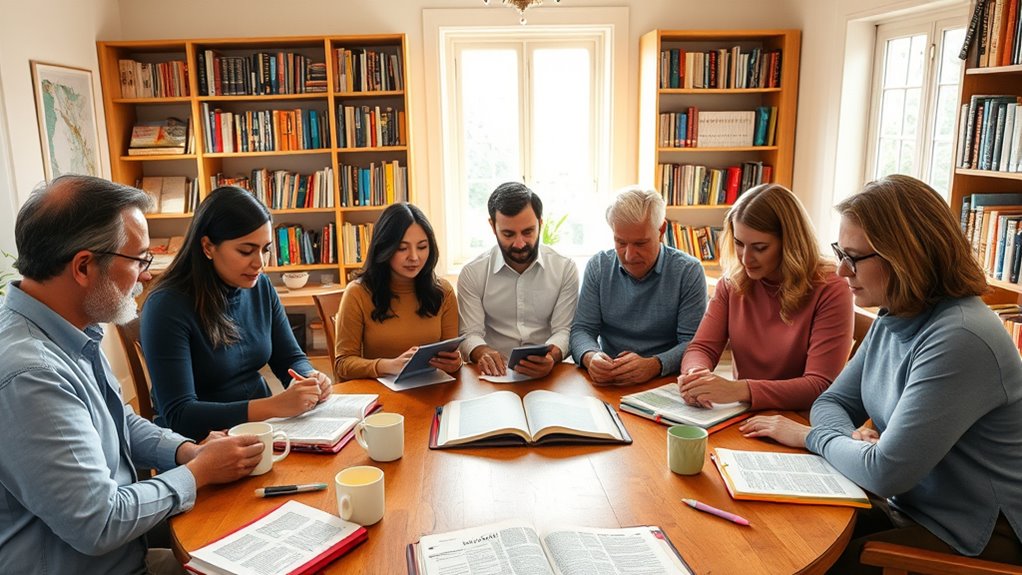
What should you consider when selecting study materials and resources for your community Bible study? First, think about the needs and spiritual maturity of your group. Are the materials accessible and engaging for everyone? Faith partnerships can help you identify trusted resources aligned with your group’s beliefs. Conduct a thorough resource evaluation to ensure content is accurate, relevant, and respectful of diverse perspectives. Look for study guides, commentaries, and digital tools that encourage discussion and growth. Avoid materials that might cause confusion or divide the group. Remember, the goal is to deepen understanding and foster community. By carefully choosing your resources, you set a strong foundation for meaningful study and spiritual development in your community.
Creating an Inviting and Inclusive Environment

Creating an inviting and inclusive environment is essential for fostering meaningful connections and encouraging participation in your community Bible study. You can do this by using welcoming gestures like warm greetings, smiles, and open body language, which make newcomers feel comfortable and valued. Emphasize diversity appreciation by honoring different backgrounds, perspectives, and experiences. Encourage everyone to share their insights and listen respectfully, demonstrating that all voices matter. Be mindful of your language and actions to guarantee they promote acceptance and belonging. Remember, a welcoming atmosphere helps build trust and camaraderie, making your Bible study a safe space for everyone. When people feel genuinely included, they’re more likely to stay engaged and grow spiritually alongside others.
Facilitating Engaging and Respectful Discussions

Building on a welcoming environment sets the stage for meaningful conversations, but facilitating discussions that are both engaging and respectful requires intentional effort. You can do this by practicing active listening, which shows participants you value their input and helps clarify understanding. Encourage everyone to share their thoughts without interruption, fostering respect. When giving feedback, use respectful language that focuses on ideas rather than individuals, promoting a safe space for open dialogue. Ask open-ended questions to deepen the conversation and invite different perspectives. Remember to monitor the tone and ensure everyone feels heard and valued. By intentionally guiding discussions with patience and sensitivity, you create an environment where meaningful, respectful exchanges flourish.
Praying for Guidance and Blessings
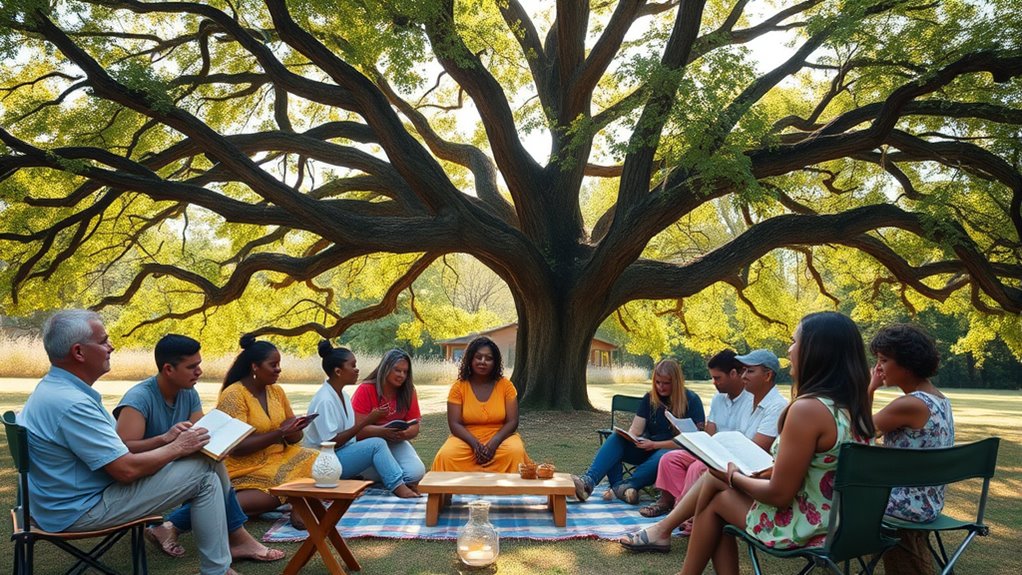
Praying for guidance and blessings is an essential part of starting a community Bible study, as it invites God’s presence into your planning and gatherings. Through faithful prayer, you seek divine guidance to align your efforts with God’s will. Praying consistently helps you stay focused and open to His direction, ensuring your group remains rooted in faith. When you lift your concerns and hopes to God, you invite His wisdom to shape your decisions and foster unity. Remember, divine guidance isn’t just about asking for answers but trusting in God’s plan for your group’s growth. Incorporate prayer into every step, and watch how God’s blessings flow through your community.
- Seek divine guidance confidently through faithful prayer
- Invite God’s blessings into your planning and meetings
- Trust in God’s plan for your group’s growth
Encouraging Continued Growth and Outreach

To encourage your community Bible study to grow and reach others, focus on fostering an inviting environment that naturally attracts new members. Invite current members to share their experiences and invite friends or neighbors to join. Consistent faithful outreach, such as community events or service projects, can expand your reach and demonstrate your group’s commitment to spiritual growth beyond weekly meetings. Encourage members to grow spiritually by setting personal goals and supporting one another’s faith journeys. Promote open, welcoming conversations that make newcomers feel comfortable and valued. By staying intentional about outreach and nurturing spiritual growth, your Bible study can become a vibrant, growing community where faith deepens and new members are inspired to join and participate actively.
Frequently Asked Questions
How Can I Handle Disagreements During Bible Study Discussions?
When disagreements arise during Bible study discussions, you should focus on conflict resolution through respectful dialogue. Encourage everyone to listen actively and acknowledge different perspectives without judgment. If tensions escalate, suggest taking a break or redirecting the conversation to a more neutral topic. Your goal is to create an environment where everyone feels heard and valued, fostering mutual understanding and maintaining a positive, faith-centered atmosphere.
What Legal or Liability Considerations Should I Be Aware Of?
Ever wondered about the risks involved? You should consider liability insurance to protect against accidents or damages during your Bible study. Is your group legally registered to avoid issues later? Ensuring proper legal registration helps establish your group’s legitimacy and shields you from potential liabilities. Taking these steps means you’re prepared for unforeseen situations, giving everyone peace of mind while fostering a safe, welcoming environment for all participants.
How Do I Recruit Diverse Participants From Different Backgrounds?
To recruit diverse participants, you should focus on cultural sensitivity and addressing language barriers. Use inclusive language in your outreach materials, and promote the study through various channels like local community centers, social media, and multicultural events. Partner with organizations serving different backgrounds, and consider offering translation services or multilingual materials. By showing respect for different cultures and making everyone feel welcome, you’ll attract a broader, more diverse group.
What Strategies Ensure Consistent Attendance Over Time?
To guarantee consistent attendance over time, you should implement motivational incentives like small rewards or recognition to keep participants engaged. Additionally, using reminder systems such as texts, emails, or phone calls helps participants remember sessions and stay committed. By combining these strategies, you create a supportive environment that encourages regular attendance and helps build a strong, engaged community around your Bible study.
How Can I Incorporate Technology to Enhance the Study Experience?
Imagine you’re in a time machine, connecting generations through faith. To enhance your study, you can leverage digital tools like interactive platforms, apps, and social media. These technologies foster engagement and community beyond weekly meetings. Use online discussion boards, videos, or live streams to deepen understanding and participation. By embracing these tools, you make your Bible study more accessible, dynamic, and inspiring—creating a vibrant, faith-filled community in the digital age.
Conclusion
Starting a community Bible study is like planting a seed in fertile soil—you nurture it with prayer, patience, and love. As you gather your group, remember that each session builds a vibrant, timeless tapestry of faith. With dedication, your study can grow stronger than a Spotify playlist, inspiring others and spreading God’s Word far and wide. Keep the faith, stay committed, and watch your community blossom into a beautiful, ongoing affirmation of His grace.










